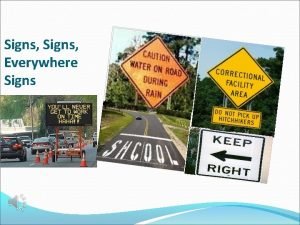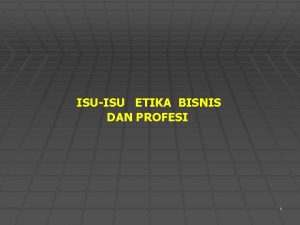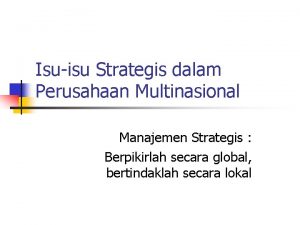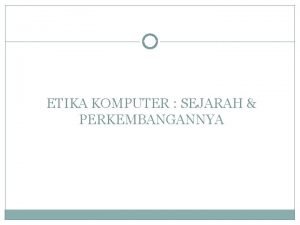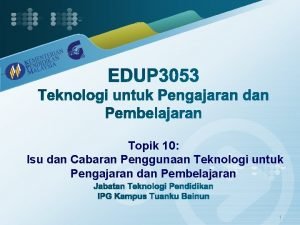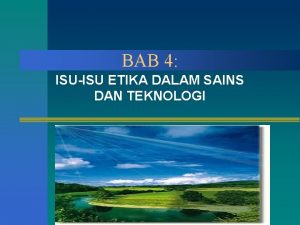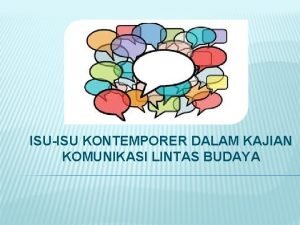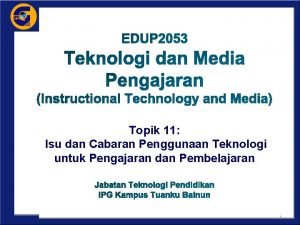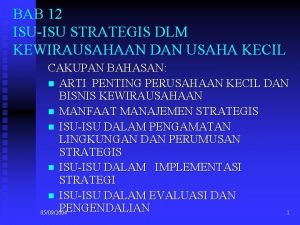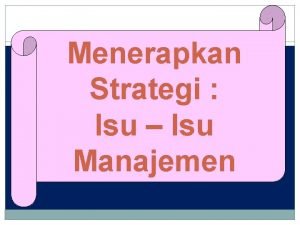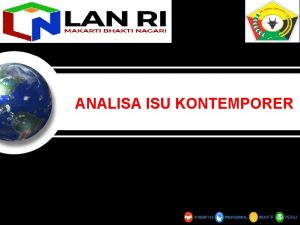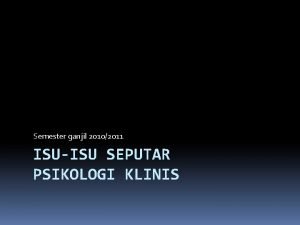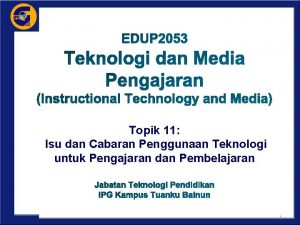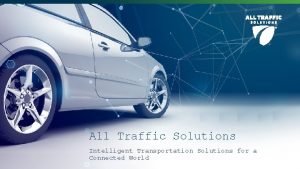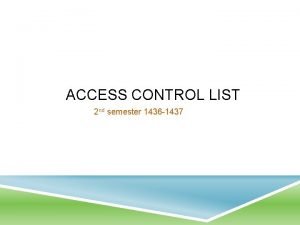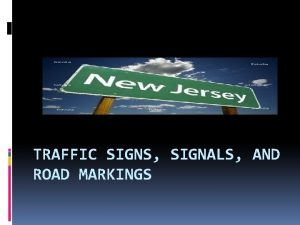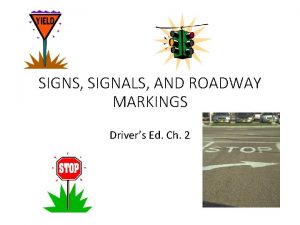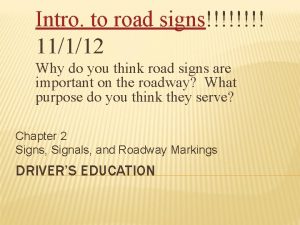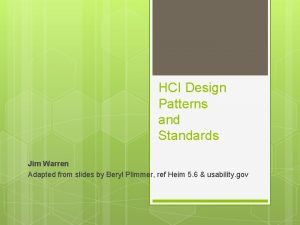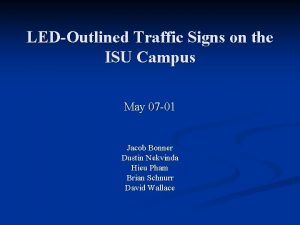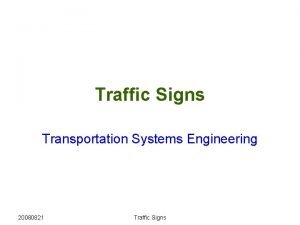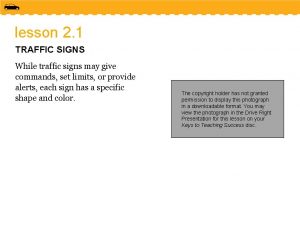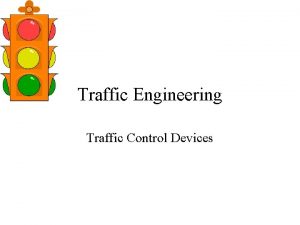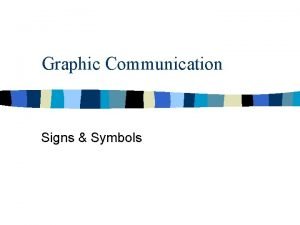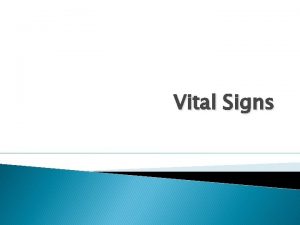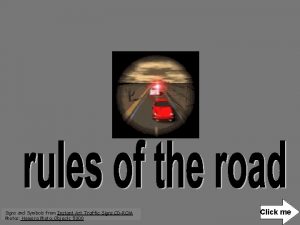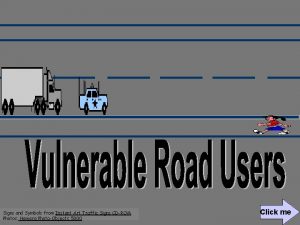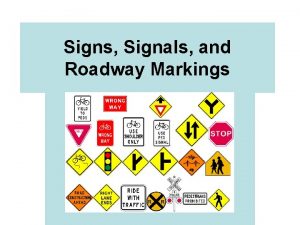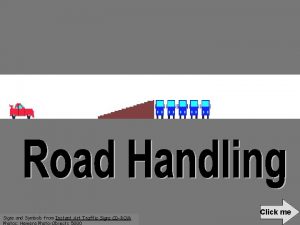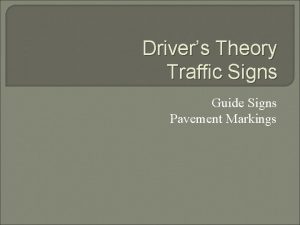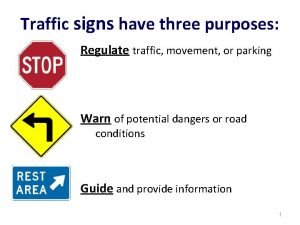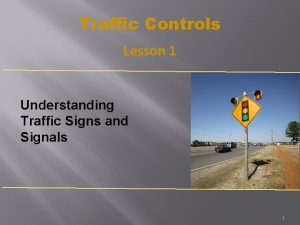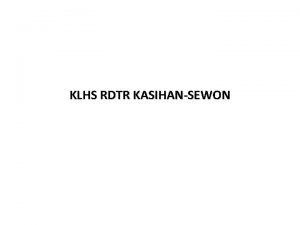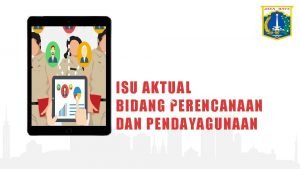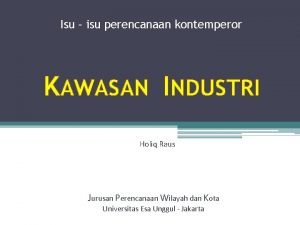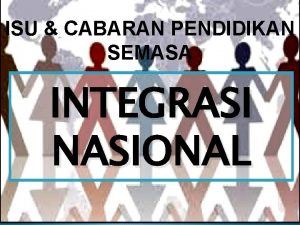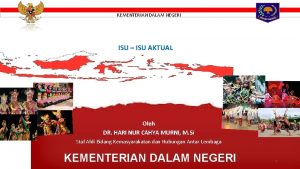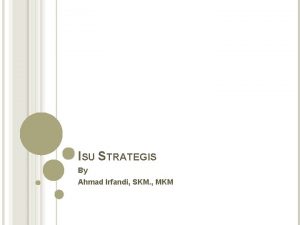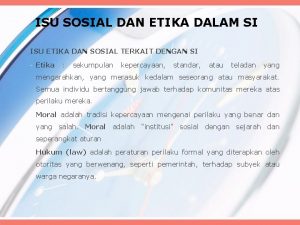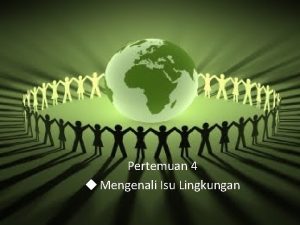LEDOutlined Traffic Signs on the ISU Campus May













































- Slides: 45

LED-Outlined Traffic Signs on the ISU Campus May 07 -01 Jacob Bonner Dustin Nekvinda Hieu Pham Brian Schnurr David Wallace

System Operation Master 2

System Operation Master 3

Presentation Outline n n n Problem description Definitions Acknowledgement Operating Environment Intended Users/Uses Assumptions and Limitations n n n Expected End Product Present Accomplishments Project Definition of Activities Resources and Schedule Closing Material 4

Definitions n n n Programmable Integrated Chip (PIC) - A small chip that can be programmed to control data flow and overall system functionality. Manual On Uniform Traffic Control Devices (MUTCD) - The MUTCD defines the standards used by road managers nationwide to install and maintain traffic control devices on all streets and highways. DOT - Department of Transportation DPS - Department of Public Safety FP&M - Facilities Planning and Management CCEE - Department of Civil, Construction, and Environmental Engineering 5

Introductory Material n Problem Statement n Operating Environment n Intended Users & Uses n Assumptions & Limitations n End Product & Deliverables 6

Problem Statement n n Rob Stupka Pedestrian traffic is extremely high on campus. Need to alert drivers of pedestrian. The signs have lights that will flash to get the driver’s attention. 7

Operating Environment n n n Iowa State University campus. The signs will be able to stand up to Iowa weather conditions. Solar powered 8

Intended Users/Uses n n Iowa State University Department of Public Safety. Motorists Students, faculty and visitorsn to campus. Alert drivers of situations that may involve pedestrians. To allow pedestrians to cross the street more safely. 9

Assumptions n n LED cluster in each corner Automatic flashing during regular 10 minute class breaks Solar powered Wireless communication Limitations n n n Sunlight availability Unprecedented extreme weather conditions LEDs must be seen at required distances and not blind motorists at night 10

End Product & Deliverables n Prototype n n n Two working signs with components. One working master control circuit. Design Report n n Documentation and schematics Parts list and assembly instructions. 11

Project Activity Approaches Considered/Used n Accomplishments n Project Activities n Project Definition n Research n Design n Implementation n Testing/Results n Other n 12

Approaches Considered/Used n LEDs – 106, 200 milli-Candela n Advantages n High level of illumination (925 ft) n Low energy consumption n Disadvantage n High current (90 m. A) n Flasher-dimmer module n Advantage n Energy saving n DOT regulation – 50 to 60 flash per minute 13

Approaches Considered/Used (cont. ) n Evaluated power system options Hard wired AC n Solar power n n Acquired software from May 06 -06 to calculate solar power needs n n Determined necessary battery and panel size PIC requirements 14

Approaches Considered/Used (cont. ) n Programmable integrated chip – PIC 16 F 877 A n Advantages n Low cost ($9) n Powerful (RAM, data size, speed) 15

Approaches Considered/Used (cont. ) Communication Infrared (IR) Wi. Fi Bluetooth (RF Tranceiver) Cost Low Highest Low Vulnerable to object interference Yes No No Vulnerable to freq. interference No Yes No Multi-connection (greater than 2) No Yes Outdoor Range 300 ft. Many miles 500 ft. Power consumption Lowest Highest Low 16

Accomplishments n Sign display Capture motorist attention n Inform pedestrian n n Reliable power source Battery - primary n Solar - secondary n 17

Accomplishments (cont. ) n Communication network Coordination -transmit/receive n Signal identification n n Programmable integrated chip (PIC) Real time n On demand - pushbutton n Automatic on/off n 18

Project Activities (1/6) Project Definition n Composed project plan n Designed physical sign system n Wrote controller software 19

Solar Power Need Calculator 20

Project Activities (2/6) Research n Battery – Seal absorbed glass mat n Advantage n n Seal completely Operating temperature (-25° C to 80° C) Less maintenance Disadvantage n n More expensive Big and heavy n Charge controller – Sun. Guard n Advantage n n Improve performance (30% per day) Over current protection Over voltage protection Low cost ($27) 21

Project Activities (2/6) Research (cont. ) Power source Cost Power line Solar power $2, 250 $796 Green power No Yes Portable No Yes Reliable Yes Some time n Battery n Store power 22

Project Activities (3/6) Design 23

Project Activities (4/6) Implementation n n Master system -Using PIC microcontroller’s internal clock for time keeping Slave system – Using a signaling LED cluster vs. countdown timer. n n n High cost -$650 to $1, 300 Bulky on the sign False sense of security 24

Project Activities (5/6) Testing n Three main test areas Subsystems component testing n Integrated systems testing n Outdoor site testing n 25

Project Activities (5/6) Testing - Subsystems 26

Project Activities (5/6) Testing – Subsystem Integration 27

Project Activities (5/6) Testing – Site Testing 28

Project Activities (6/6) Other Using round tube instead of Telespar n Evaluated software language (C, ASM, JAL) n 29

Resources & Schedule n Personal Effort n Financial Requirements n Schedule 30

Personal Effort Total Hours: 975. 5 31

Financial Requirements Item Cost Signs Donated LED’s $120. 00 Battery $304. 00 Solar Panel $338. 00 Solar Panel Mounts $100. 00 Hardware Donated Communications $100. 00 PIC $20. 00 Enclosure $200. 00 Controller $168. 00 Total $1, 350. 00 Total Cost: $13, 056 32

Schedule 33

Closing Material Project Evaluation n Commercialization n Additional Work n Lessons Learned n Risk & Risk Management n Closing Summary n Questions n 34

Project Evaluation May 07 -01 Design Evaluation Relative Importance (%) Functionality Evaluation Score (%) Resultant Score Signs will flash when requested from the pushbutton 30% 100% 30% Automatically flashes signs during high traffic times (class transitions) 20% 100% 20% Signs successfully send and receive information with the master controller 20% 100% 20% System will be able to operate only on solar power 15% 100% 15% System will comply with all known traffic laws and standards 10% 10% Systems will be able to operate under all weather conditions 5% 100% Total 35

Commercialization n This product is already commercially available. n n Around $6, 250 May 07 -01 price is much cheaper n Around $1, 400 (w/o labor) TAPCO sign May 07 -01 36

Additional Work Audio system for the blind n Logging system for tracking use of system n Proximity sensor to automatically turn the system on n WWVB and Real Time Clock n 37

Lessons Learned (1/5) What Went Well Client-team interaction n Team communication n On schedule throughout most of project n Constantly working even when parts were missing n 38

Lessons Learned (2/5) What Did Not Go Well n Delayed arrival of components Could not get the system installed in time n Testing was delayed n n Inadequate research prior to initial ordering Area researched ≠ area implemented n Communication with supporting departments n 39

Lessons Learned (3/5) Technical Knowledge Gained PIC programming and functionality n Communication technologies n Mechanical engineering skills n MUTCD regulations n 40

Lessons Learned (4/5) Non-Technical Knowledge Gained Project management n Schedule management using Gantt charts n Communication management between multiple departments n DPS n FP&M n CCEE n DOT n 41

Lessons Learned (5/5) Things Done Different Next Time Divide into sub-sections earlier n Make sure components are finalized with client so ordering can take place sooner n Start testing earlier n 42

Risk & Risk Management Anticipated potential risks n Loss of team member n n Every member knows what the other is doing Not encountered Unanticipated encountered risks n Flasher/Dimmer module was incorrectly labeled and destroyed. n n Team pulled same module from another project Lack of interest by certain contacts involved with the project. n Client was addressed and assured the team of the project’s importance 43

Closing Summary System is intended to save lives n Provide a means of warning n No guarantees n Give a chance to avoid tragedy n 44

Any Questions? 45
 All traffic signs and meanings
All traffic signs and meanings Isu isu etika bisnis
Isu isu etika bisnis Isu-isu strategis dalam perusahaan multinasional
Isu-isu strategis dalam perusahaan multinasional Isu-isu pokok etika komputer
Isu-isu pokok etika komputer Piawaian guru iste
Piawaian guru iste Etika sains dan teknologi
Etika sains dan teknologi Isu-isu komunikasi lintas budaya
Isu-isu komunikasi lintas budaya Simkuliah
Simkuliah Isu etika dalam penulisan
Isu etika dalam penulisan Isu isu kewirausahaan
Isu isu kewirausahaan Isu pemasaran
Isu pemasaran Teknik tapisan isu usg
Teknik tapisan isu usg Isu psikologi klinis
Isu psikologi klinis Isu etika dalam penulisan
Isu etika dalam penulisan Intelligent traffic solutions
Intelligent traffic solutions Inbound traffic vs outbound traffic
Inbound traffic vs outbound traffic Orange diamond shaped signs warn the motorist of
Orange diamond shaped signs warn the motorist of Uncontrolled railroad crossings usually have
Uncontrolled railroad crossings usually have Traffic signals of language
Traffic signals of language A traffic control officer's signal
A traffic control officer's signal The purpose of traffic signs are *
The purpose of traffic signs are * What shape are traffic signs giving orders
What shape are traffic signs giving orders Natural and conventional signs
Natural and conventional signs Railroad signs and meanings
Railroad signs and meanings The diamond shape is used exclusively for _____ signs
The diamond shape is used exclusively for _____ signs Hci design patterns
Hci design patterns Mật thư anh em như thể tay chân
Mật thư anh em như thể tay chân Tư thế worms-breton
Tư thế worms-breton Bổ thể
Bổ thể Tư thế ngồi viết
Tư thế ngồi viết ưu thế lai là gì
ưu thế lai là gì Thẻ vin
Thẻ vin Cái miệng xinh xinh thế chỉ nói điều hay thôi
Cái miệng xinh xinh thế chỉ nói điều hay thôi Thể thơ truyền thống
Thể thơ truyền thống Các châu lục và đại dương trên thế giới
Các châu lục và đại dương trên thế giới Từ ngữ thể hiện lòng nhân hậu
Từ ngữ thể hiện lòng nhân hậu Diễn thế sinh thái là
Diễn thế sinh thái là Thế nào là giọng cùng tên?
Thế nào là giọng cùng tên? Phép trừ bù
Phép trừ bù Tỉ lệ cơ thể trẻ em
Tỉ lệ cơ thể trẻ em Bài hát chúa yêu trần thế alleluia
Bài hát chúa yêu trần thế alleluia Khi nào hổ mẹ dạy hổ con săn mồi
Khi nào hổ mẹ dạy hổ con săn mồi đại từ thay thế
đại từ thay thế Vẽ hình chiếu vuông góc của vật thể sau
Vẽ hình chiếu vuông góc của vật thể sau Quá trình desamine hóa có thể tạo ra
Quá trình desamine hóa có thể tạo ra Công thức tính độ biến thiên đông lượng
Công thức tính độ biến thiên đông lượng
